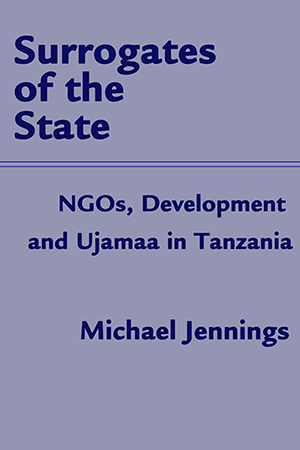
- 2007/262 pages
- A Kumarian Press Book
Surrogates of the State:
NGOs, Development and Ujamaa in Tanzania
Hardcover: $52.00
ISBN: 978-1-56549-243-1
In Surrogates of the State Jennings explores the delicate relationship between development NGOs and the states they work in using his exhaustive and illuminating case study of Tanzania in the 1960s and 70s. During that time Tanzania instituted the rural socialist Ujamaa program, resulting in the forced resettlement of 6 million people to villages, transforming the map of the country. Rather than questioning this policy, NGOs working in the area (as typified by Oxfam) became surrogates of the state, helping to carry out the program.
Jennings argues that the NGO community was seduced by its own interpretations of what Ujamaa represented, and was consequently blinded to the dark realities of resettlement. Bound by ideological chains of their own forging, organizations that in other contexts have criticized over-mighty states and the use of overt force, NGOs committed themselves fully to Tanzania and its development policy. Through this study, the book uncovers not just the story of development in Tanzania in this critical period, but the history of the NGO itself, in the process raising questions about the future direction of this institution which has become so prominent in international development.
Jennings argues that the NGO community was seduced by its own interpretations of what Ujamaa represented, and was consequently blinded to the dark realities of resettlement. Bound by ideological chains of their own forging, organizations that in other contexts have criticized over-mighty states and the use of overt force, NGOs committed themselves fully to Tanzania and its development policy. Through this study, the book uncovers not just the story of development in Tanzania in this critical period, but the history of the NGO itself, in the process raising questions about the future direction of this institution which has become so prominent in international development.





